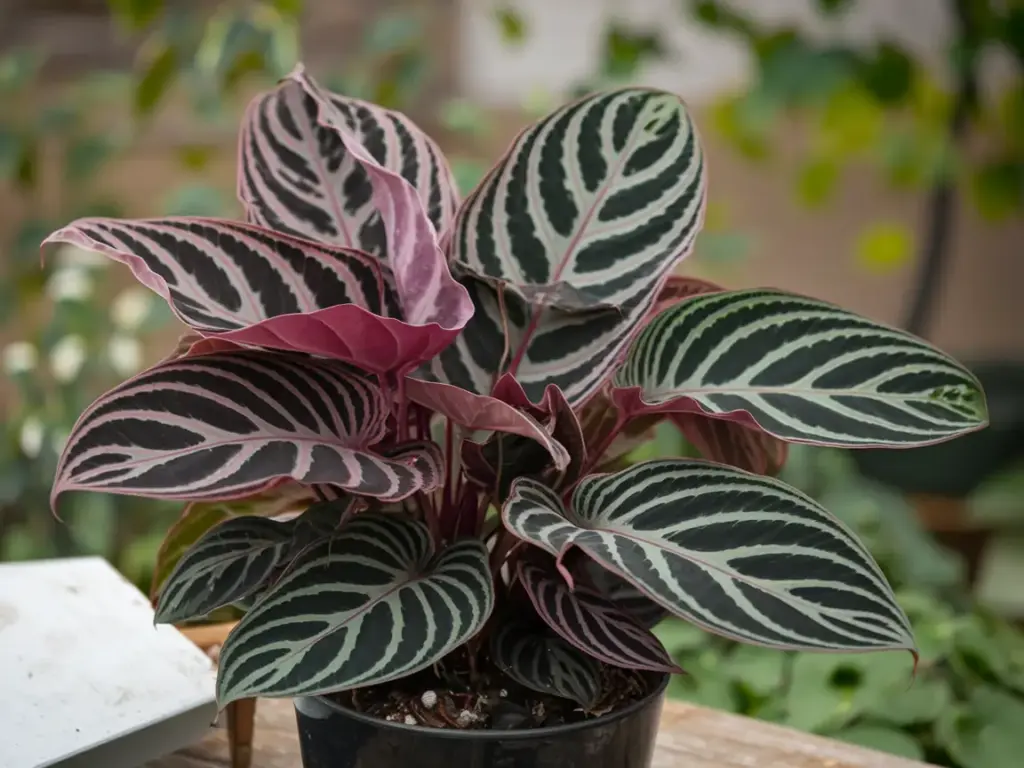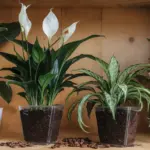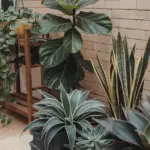9. Calathea Warscewiczii (Velvet Calathea)

When I first touched a Calathea warscewiczii, I couldn’t believe how incredibly soft it was! This velvety beauty feels like stroking the softest plush fabric you’ve ever encountered. After growing several of these stunning plants, I can tell you that while their name might be hard to pronounce (var-she-viz-ee-eye), their unique texture makes them absolutely unforgettable!
The Incredible Velvet Texture
What makes this Calathea truly special:
- Dark green velvety leaves with a luxurious texture
- Fishbone-like pattern on the upper leaf surface
- Deep burgundy undersides that add drama
- Leaves that feel like actual velvet to the touch
Fun fact: The velvet texture actually serves a purpose – it helps the plant collect and distribute water in its natural habitat!
Perfect Care Environment
Through years of experience (and yes, some velvet-related mishaps), I’ve discovered the ideal conditions:
- Light: Moderate to bright indirect light
- Humidity: Needs 65%+ (higher than most Calatheas!)
- Temperature: Must stay between 68-75°F (20-24°C)
- Soil: Rich, airy mix with extra orchid bark
Understanding Growth Habits
Here’s what to expect from your Velvet Calathea:
- Height: Can reach 2-3 feet tall
- Spread: Usually 1-2 feet wide
- Growth rate: Slower than other Calatheas
- New leaves: Emerge tightly rolled with intense color
Essential Maintenance Guide
My tried-and-true care routine includes:
- Careful watering schedule (check every 3-4 days)
- Regular humidity monitoring
- Gentle leaf cleaning with soft brush
- Monthly inspection for pests
- Rotation for even growth
Pro tip: Never mist this variety – those velvety leaves are prone to water damage!
Dealing with Common Issues
Let me share a near-disaster story – I once almost lost my warscewiczii to spider mites. Here’s what I’ve learned:
- Spider mites: The biggest threat (they love velvet!)
- Brown edges: Usually humidity related
- Fading velvet texture: Often light stress
- Yellow leaves: Typically overwatering
- Leaf curling: Temperature or water stress
Expert Success Tips
Want to master Velvet Calathea care? Here’s my secret sauce:
- Use a paintbrush for dusting leaves
- Never touch leaves with wet hands
- Create a humidity dome for younger plants
- Keep away from windows (even indirect drafts)
- Inspect weekly for early pest detection
Special Maintenance Requirements
The velvet texture needs extra attention:
- Clean leaves with dry, soft makeup brush
- Avoid water on leaves at all costs
- Monitor for dust buildup weekly
- Check leaf undersides regularly for pests
Ready to discover a truly unique Calathea that actually blooms? Up next, we’ll explore the Calathea Crocata, known as the Eternal Flame for its stunning orange flower spikes! Click the next button below to learn why this flowering beauty might be the perfect addition to your collection, and discover my secrets for encouraging those spectacular blooms!









GIPHY App Key not set. Please check settings